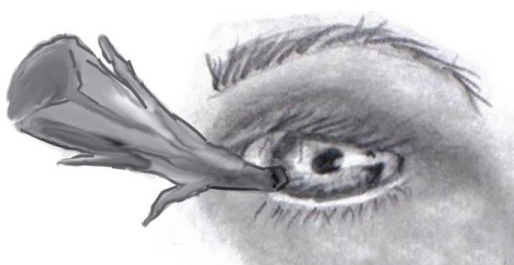
Traci and I were once on a long trip between relatives on Easter Sunday, when our kids were little. We stopped at a nearly empty restaurant (Taco Johns I think) for a meal and let our kids run get a little exercise by running around a little bit after having been cooped for the last several hours. The only other family had been sitting on the other side of the restaurant and left a few minutes later. As the woman of the family left the restaurant, she shouted back at us that we had the worst behaved kids she had ever seen, and then she quickly exited.
Now, how effective do you think that was at getting Traci and I to change our parenting style? Did she have our best or our kids best in mind as she did that? Do you think we felt lovingly corrected? If you were challenged on some "sin" of yours by a stranger, how would that make you feel? Would you listen or put much stock in what they said? Would you perhaps react defensively and begin to argue about your own righteousness or try to figure out a sin of theirs?
Recently, I heard two people in a conflict like this. One person felt it was their responsibility to point out something wrong in the other person, but similar to our case above the manner in which it was delivered did not feel loving. Shockingly, the one being corrected did not take it well and got upset in response! As I reflected on it, I realized that I have been the person on both sides of this type of unloving correction.
Now as a Christian it is not wrong to go to a brother or sister in the Lord and point out some flaw, and we are commanded in Matthew 18:15-18 that if someone has sinned against us we must go to them to point their sin. James 5:19-20 tells us that by correcting someone who is in error, we can be part of saving their soul from death. Furthermore, anytime we share the full gospel, it becomes necessary to tell people that God says that are sinners.
Therefore, we know that correcting someone is not in and of itself wrong, but how and why we do it make a huge difference in how the corrections will be received. Matthew 7:1-5 challenges us to examine our motives if we desire to help someone else through critique. Here Jesus points out that we cannot help someone else with some minor character flaw (a speck in their eye) if we ourselves have major character flaws (a log in our eye.)
If I see something wrong in the world or in another person that I think needs to be corrected, the first step for me should be to begin examining myself. If I have major issues in my life, then the other person and everyone else will clearly see my hypocrisy for telling someone else to correct their lives while I am not even willing to examine myself let alone change. It will be clear that my motive for challenging you is not to help you, but rather to tear you down, probably to make myself feel better in comparison.
If you are the type of person who sees injustice in the world and sin in other people that needs to be corrected, God may have given that to you as a way to help others. On the other hand, He may have also given that impulse to you as a challenge for you to humble yourself and repent, so that you will be able to go to others in love. Jesus at times was very harsh in His criticisms, but he also wept in love over the sin of his people. He also welcomed anyone into his company who came humbly themselves from the prostitute to the Pharisee.
Jesus came to change the world, and he uses us as agents of change. Let him change you first so that when you go to into the world your encouragement and challenges will be seen as acts of love, not hypocrisy.
No comments:
Post a Comment